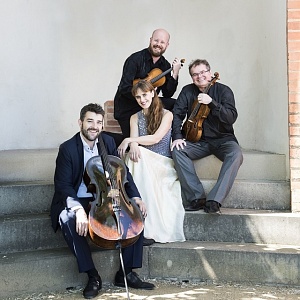
PETR VERNER FROM DVOŘÁK PIANO QUARTET
GENERIC INTERVIEW


In November 2018, the Dvořák Piano Quartet released their debut album containing Antonín Dvořák's Piano Quartets No. 1 & 2. The ensemble began performing as the Dvořák Piano Quartet after having received approval for using the name of the world-renowned composer from his direct descendant, Mr. Antonín Dvořák III. We asked the violist Petr Verner a couple of questions about the new release, about members of the quartet as well as about their plans for the future.
Mr. Verner, can you tell us whether you were always certain that you would opt for Dvořák’s piano quartets to be featured on your debut Supraphon album?
By no means did we want to hasten our decision concerning the recording. When we began giving thought to our first CD, we were only sure that it would include the second of Dvořák’s quartets, Op. 87, and initially we intended to add to it Johannes Brahms’s famed quartet, Op. 25. Nonetheless, we changed our mind when we were further exploring Dvořák’s first piano quartet, Op. 23, which so enthralled us that we fell for it. Ultimately, a “pure” repertoire choice prevailed. Yet at the time of our decision-making we of course had no inkling that the album would be released on Supraphon. We are really pleased that the label undertook the project.
What are Antonín Dvořák’s quartets like?
Antonín Dvořák was maturing throughout his artistic career, constantly coming up with ever more wonderful, ever more inspired compositions. Following Opus 9, all his pieces are splendid. The reason why his earlier works have been – regrettably – less frequently performed is the fact that he wrote such an enormous amount of magnificent chamber music. Piano Quartet No. 1, Op. 23, which Dvořák composed in the wake of his gracious serenade for strings, already bears all the traits of his mastery. At the time, he was enjoying success at long last. Opus 23 teems with animation, youthful spirit and strength, yet when it comes to the atmosphere and form in terms of style, it starkly differs from Dvořák’s far more frequently performed Opus 87, written concurrently with Symphony No. 8, just before he reached the creative apex. The two quartets are clearly and discernibly Dvořák’s, albeit they are charmingly contrastive.
Is there a “leader” of your ensemble?
I personally think that piano quartets should be led by the pianist, who as though through a “Bluetooth” should be connected to the first violinist, who now and then must take the reins and be equally bold. In our conception, the pianist naturally plays the predominant role, which is possible owing to Slávka Vernerová, who in addition to perfectly mastering her instrument possesses the virtues of a thoughtful analytical musician with a refined taste. That, however, does not mean that all the other ensemble members are not afforded scope for voicing their own suggestions and inspirations. Our quartet is made up of four strong and experienced personalities.
Do you often play Dvořák’s quartets at your concerts?
Yes, we have performed them very often. And I think that the two quartets can be played within a single concert. We have done so on several occasions, and I would like us to perform them next to each other more frequently. Given that Dvořák created the two pieces within an interval of many years, they are, as I have said, contrastive, and their juxtaposition could be quite intriguing for the audience.
What about your core repertoire? Which works have you performed most frequently?
We usually put programmes together in, say, the conventional way. The majority of our concerts start with music dating from the Classicist era (Mozart, Beethoven), following which we strive to present new works. To date, contemporary Czech composers have written half a dozen or so works for us. And we also like performing grand Romantic pieces, by Schumann, Brahms or Dvořák in particular. We have a penchant for novel, unusual projects. At the Prague Spring festival, for instance, we played an unknown, yet wonderful Impressionistic quartet by the French composer Mel Bonis.
Could you introduce your colleagues in the ensemble?
Yes, with great pleasure. I would like to begin with the lady I have mentioned earlier – the pianist Slávka Vernerová-Pěchočová, a top-notch soloist and chamber musician, who has often been invited to work with renowned orchestras and ensembles. Her style has been influenced by her having taken lessons over the long term from the legendary pianist and educator Ivan Moravec, who thought highly of her, expressing so great a respect that I cannot even specify, although I heard him utter his sincere appreciation many times. Yet an extremely modest person as she is, Slávka would never and nowhere refer to having received such praise herself.
Our cellist Jan Ždánský, a man of many talents and piercing intellect, has worked both in the Czech Republic and Austria. Besides being a brilliant player, he is an organiser and collector. In our quartet, he is a sort of supervisor of the musical order, which is a task of the utmost importance.
Our first violinist is Štěpán Pražák. I got to know him years ago as a remarkable, emotionally pregnant first violinist of a string quartet. He and I share very similar artistic opinions, and I am happy that he is now a member of the Dvořák Piano Quartet, the ensemble that I dreamt up a long time ago and which I deem to be my “beloved child”.
What concerts are you scheduled to give soon, and which of them do you look forward to the most?
We are scheduled to perform in the Czech Republic, Germany and Austria. When it comes to the next season, we are negotiating about giving concerts in Canada and France, and returning to the UK. We look forward to all of them, as we do not think of how prestigious the venues we appear at are.